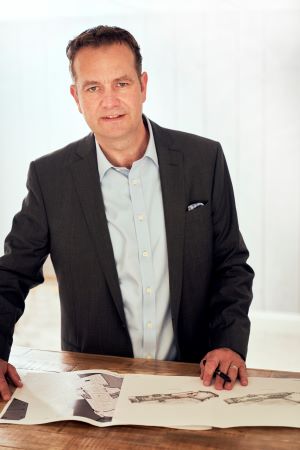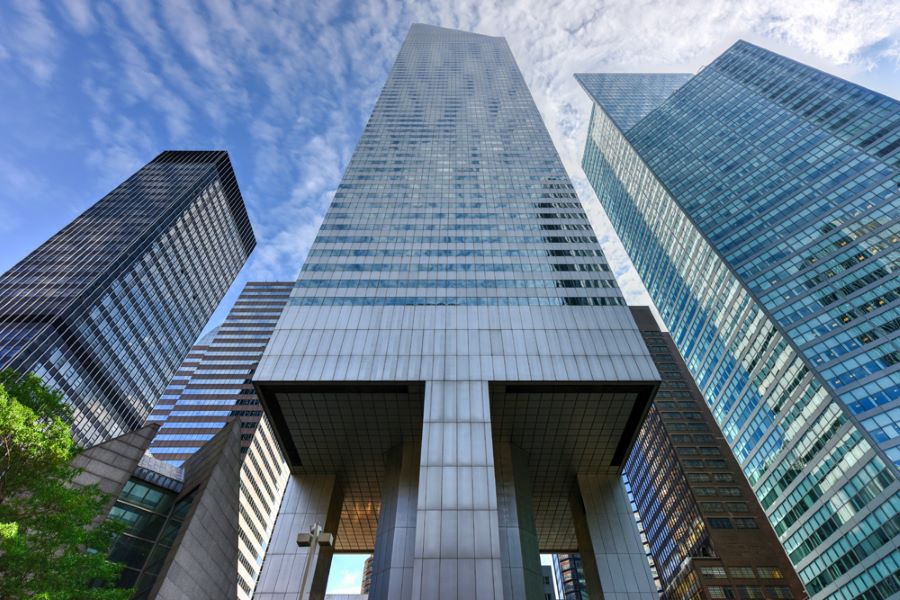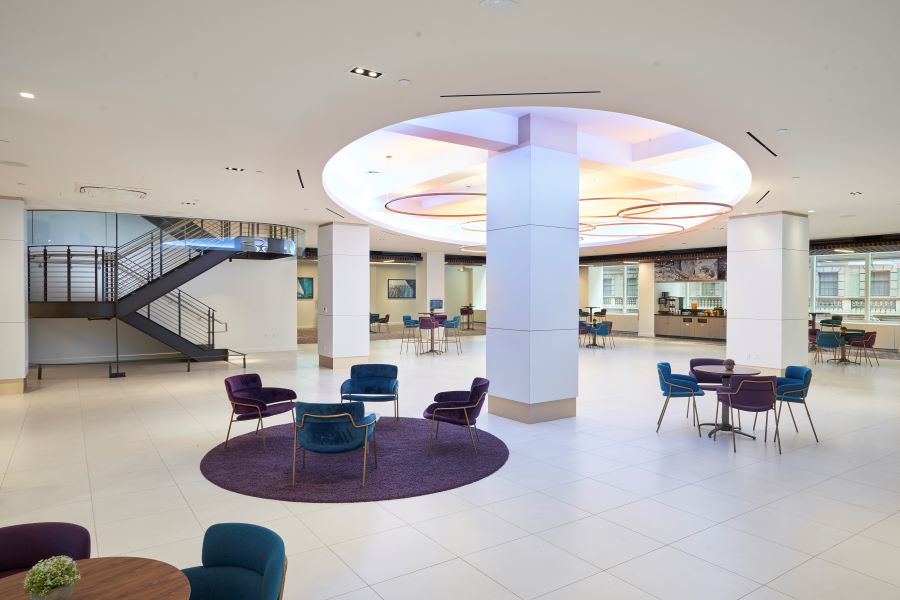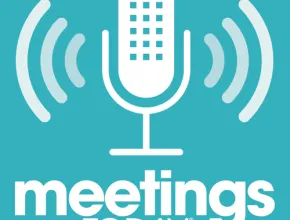etc.venues' Garrett Ronan on Meetings Industry Trends and Beyond
Garrett Ronan, U.S. chief operations officer for etc.venues, talks about post-pandemic meetings and conference center trends and the company's potential expansion plans in the U.S. after opening two New York City venues shortly before COVID-19 roiled the industry.
In this Meetngs Today Podcast, Tyler Davidson talks with Ronan about the U.k.-based non-residential conference center company's expansion into the U.S. after opening two locations in Manhattan, expansion plans and how the pandemic has changed the landscape of meetings and the workforce.
Listen Now:
Listen Next: Recovery on Pace: "Shimo" Shimasaki on the Pace of Meetings Bookings
Transcript:

Tyler Davidson: Hello, and welcome to this Meetings Today Podcast. I'm Tyler Davidson, chief content director of Meetings Today, and joining us today is Garrett Ronan, U.S. chief operations officer of etc.venues and who oversees the company's first U.S. venues, which are two of them, both located in midtown Manhattan. Thanks for joining us, Garrett.
Garrett Ronan: Thank you very much Tyler. Great to be with you today.
Tyler: Your company primarily operates in the U.K. now with--I kind of did the quick math--but maybe 13 venues in London, and then venues in Birmingham and Manchester, England.
Garrett: That's correct. Yes. And that's where it all started 30 years ago. So we've been around for a while. And we're excited to bring what we do and our approach to New York and introduce that form of hospitality and unique approach to meetings to the U.S. market.
Tyler: And you have been with a the company, I believe, maybe a couple of years. And we were talking briefly before we hit the record button here, but it was kind of interesting. You joined right before the pandemic hit, unless I misunderstood.
Garrett: No, that's right on the money. I joined technically the 18th of March, which I think was two days after the the world was told to shut down. So yeah, it's been an interesting time, as I think it has been for everybody, particularly the hospitality world, and I think everybody on a personal level and on a professional level.
Tyler: And for our listeners who aren't familiar with etc.venues, describe what it's all about. And I know they are, I guess some people call it, non-residential conference centers or day conference centers. So what do they bring to the meetings market, and what distinguishes you from your competitive set?
Garrett: Well, I think the standalone venue brings a lot of flexibility and adaptability, particularly in a large urban setting where either you have a local company that's bringing a local, more domestic group that perhaps doesn't need hotel accommodations.
And also, if it's visiting groups, or a conference where you've got people flying in, it gives an opportunity to not have to be in one place day in, day out, if it's a two-, three-day event where sometimes you don't see the light of day, literally. We partner with several hotels in the area, and therefore people get to go out and experience and do different things.
I think our approach and what we do with our venues--one thing that's very important to us is natural daylight, if you're going to be in a conference or training session all day, to lose perspective is not good for the mind's alertness. If you're, again, in a space that doesn't have natural daylight, at least you react and respond better.
That's what our customers have told us and we've continued to adapt what we do and how we build our venues based on specific client needs. I think our differentiators from the market, looking at the New York market, is the we have an all-in-one pricing approach. So we base it on day delegates.
So, if you have 100 attendees, we will give you a price for that starting from when you arrive in the morning, through your breaks, through your lunch, through your afternoon, offering, with all-day coffee approach. So it's not your urn coffee, it's bean to cup. And we also build our spaces where as a company you can come in--we take a sort of a blank canvas approach--you can come in and brand how you want and make it look like you're walking into, you know, that company showroom.
I think the other big differentiator for us, and one of the reasons why we brought [etc.venues] to New York, is our clients are international and have for years been talking to our founders saying, 'When are you bringing this to New York,' because they operate in London, they operate in New York. It's the big banking institutions. It's the law firms. And ultimately, we brought it here.
And one of the things that they like is this all-in-one approach, versus ala carte that you sometimes get in the more traditional hotel environment, as well as what I would call a European sensibility to hospitality. I like to describe it as nothing is too much trouble.
People say to me, 'What happens if a client asks you for something that that you can't do?' I try and tell our team, Look, the answer is yes. Now, what's the question? And let's figure it out.' The client never should feel that something is too much trouble. And we would never give the answer, 'Oh, we can't do that.' We'll come back with an option or an alternative.
But it's trying to be that so that an organizer feels, 'Oh, my God, suddenly...they're calm. They get in there knowing that everybody's there to make this work for them.

Tyler: And so typically, for a client, how long, for how many hours, would they book a venue? And can you do events, like, I guess, formal meetings in the morning and then break for, say, a catered lunch, and then do event, something like a cocktail reception, at the end of the meetings?
Garrett: Absolutely. We, for all our venues, we apply for and look to secure a full liquor license that allows us to run full events. Let's say it's a two-, three-day conference. That would be one example where you come in, you set up, you start from breakfast.
And again, one of the other differentiators is we do not go outside for food, we have our own kitchens, we have our own chefs. And we take a very healthy approach. Again, looking at that mind-nourishment piece; it's not about you know, sweets and carbs, it's also about healthy eating.
So, we're able to provide that throughout the day, and then turn the space and create an evening atmosphere where you can have a drinks reception or an So, I think everybody's trying to rediscover or figure out what our company is going to do. What are employees going to do? What's the work week going to be? You know, I think the reality is people have enjoyed some flexibility.
I think the reality also is to be productive, and to have a fulfilling company culture and a productive workforce or team, you do need togetherness.
So, you know, I'm seeing from everybody we're talking to--both from landlords across the city to our clients--most are going to be returning in some shape or form, whether that's a four-day work week or a three-day work week. But when they come in, they need to come together.
The other big shifting change, and you'll see that in real estate reports...within the big markets like New York, there's a huge swath of real estate that's now going on the market and is going to stay on the market as companies figure out about resizing.
One example I can give you in the building where we have our 360 Madison location, one of the tenants, large tenants, in there is reconfiguring their space; they're going to release the floor. And they've told the landlord, and ask directly because we're in there, that they no longer need to be renting and paying for meeting space within their own [building], when they can just come and use it if they need it once a week or once a month. They come to us.
We see town halls increasing as people bring workforces back together and teams together. Collaborative needs, I think. I certainly have felt the effects of Zoom fatigue and hence a much more stressful day when you're just on back-to-back video calls. And what do you get from that? Yes, it can be productive to a point; it can be an assist if somebody can't fly in for an event.
But I think the most productive meetings and deals, and the way business is done, is in person. We all crave human interaction, and that's what's coming out of this as we go forward.

Tyler: Excellent. And I know covering the conference center segment for as long as I have, it always seems like the concept was much more ingrained in Europe, even in Scandinavian countries, and a lot of the U.S. conference centers take a lot of trends from Europe. Do you agree with that? And why do you think that is? And do you think etc.venues will expand in the U.S. in the future?
Garrett: If you don't mind, I'm going to start in reverse...
Tyler: That was a bit long and convoluted...
Garrett: No, no. Only because I don't know that I've really sat back and thought about it being more proliferated in Europe. But yeah, I do have a couple of views on that I'm happy to share, sure.
In terms of etc, yes, we are going to expand our intention and desire. And the demand we're seeing encourages that we're--without giving anything away--we're back out looking at locations for our third venue. And we're in some advanced conversations at the moment that makes that third, and possibly even a fourth, will happen quite quickly. The deals are not done yet, but we're very encouraged.
Our plan really is to grow to probably 12 to 15 units on the Eastern Seaboard. And I would say Eastern Seaboard to include Chicago--I hope they won't kill me in Chicago for saying that--but you know, we see markets like D.C., and with the shift in businesses relocating to the likes of Austin and Miami, those will be markets that will be interested.
Down the road Boston, and the large expansion in New York, we certainly see ourselves, similar to London, doing multiple venues in New York. In terms of why in Europe, I think there's often a culture of...maybe it's routed around the family. And people don't necessarily like to be heading off for conferences and meetings for three and four days. Travel distances tend not to be as big unless you're going across Europe.
So, for example, if you're living in in Birmingham, or York, in the U.K., you can go up and back in an hour, an hour and a half. So why would you stay overnight? You know, and I think in the hotel environment--having grown up [in it] and that's my whole background, that's how I started--I think it's a very different offering. It's a great offering, but sometimes it has to appeal to many different markets. Whereas what we do, we're able to build and specialize to purely that corporate experience.
Tyler: I've always described conference centers as sort of like a thoroughbred experience, because it's very purpose built.
Garrett: Yeah, that's a great way of putting it.
Tyler: And with your background, of course, working at all levels in the hotels, events and restaurant industry, what lessons do you think traditional residential media facilities can learn from the segment you're representing right now?
Garrett: I think it goes back to the word that oftentimes gets overused in hospitality, or of hospitality. And I think those of us in the business world, subscribe to it. But sometimes you can get caught up in the restrictions of your format, or how you do business, that you lose that 'can-do, we'll get it done' attitude.
Our team and each person on the team, one of the things we say to them before they join or if they're expressing interest in joining us is, 'Look, it's a roll up your sleeves approach. If one of your team members needs help--you will have a dedicated role--but if something changes, because clients might decide they want lunch 30 minutes early, they might be running late. We need to make sure that it's ready and that may mean pitching in.
So. I think I think that piece and the approach to inclusive pricing--nobody likes to be allocated to death in terms of every time you think, 'Oh, what do you mean I have to pay for my coffee? Oh, sorry, I have to add my lunch as well?Oh, the projector and screen and flip chart, that's extra as well?' So I think those are big differentiators for us.
Tyler: Excellent. Well, I know you have to take off here. But I have one more question. And putting on your hospitality industry veteran hat. What meeting trends are you seeing in the near future, just in general, across the industry?
Garrett: I think we touched on it a little bit ago, in terms of what's this new workweek, what are people in the workforce demanding of their employers. So, adjusting to that work week, I think will bring the benefit of coming together for these types of town hall meetings.
I think the Zoom fatigue we've all gone through...at the end of the day, I think, I look at the positives of technology and those aspects have come on what would take 10 years in one year to 18 months.
As we talk about the green environment, it means you don't have to fly somebody in, and that they can still participate on some level. I think that whole hybrid piece, while it's not the core of our business, and we don't believe it's the future of the business, but it offers flexibility and the ability for people to still engage.
Tyler: Yeah, and I know, just really quick to get to covering a little bit of what's going on in Europe, I know that they're very aware of what they call--I don't know if it's half-jokingly--carbon shaming. I don't think we quite have that over a year yet. but...
Garrett: There's definitely a move towards it. And look, I think we all believe in and want to protect our environment. But like anything in life, you need a practical approach and how to get there, and in a practical timeline, so that these things can be achieved.
Tyler: Well, thank you for joining us, Garrett. I really appreciate it.
Garrett: Tyler, my absolute pleasure. And thank you for reaching out, and certainly if I can help with anything in the future or need any clarification, we'd be happy to be available.
Tyler: I appreciate that. Thank you. And that Garrett Ronan, U.S. chief operations officer at etc.venues, who oversees the company's first two U.S. venues, which are based in New York in midtown Manhattan.
I'm Tyler Davidson, vice president and chief content director of Meetings Today. Thank you for joining us today for this Meetings Today Podcast. And if you're interested in any of our other webinars, head over to Meetingstoday.com.
Check out our webinars section where you can delve into a variety of podcasts from all sorts of thought leaders in the meetings industry. So wherever you're at today, thanks for joining us and have a great rest of the day.





